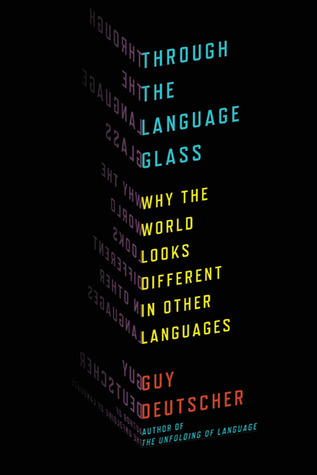When I started studying linguistics a few years ago, I was surprised at how close some of the topics in linguistics sounded to the stuff I had encountered in the philosophy classes I had taken years previously. I am currently interested in the area where these two disciplines meet, and I have just read a book that has helped me identify one of the boundaries between linguistics and the philosophy of language.

Through the Language Glass by Guy Deutscher is a book about linguistic relativity. Linguistic relativity is the idea that the different languages spoken around the world affect the thoughts of their speakers in different ways. Apparently this idea used to be fairly widely accepted, but it went out of fashion for a good half century. In this book, Deutscher gives several examples of how different languages affect how their speakers think, but he makes it very clear that while languages can affect the thoughts of their speakers, they do not limit these thoughts. Languages aren’t static, so even if a language comes across something that it can’t express, it can always create a way of doing so or borrow a way from a different language.
The specific concepts that Deutscher uses to explain how different languages affect the thoughts of their speakers are colour, gender and direction. Through experiments, scientists have shown that our thought patterns relating to these concepts are actually affected by the language that we speak. For example, people who speak Russian are slightly faster at differentiating shades of blue because their language has different words for light blue and dark blue. The actual differences between how different language users think about colour, gender and direction may seem small, but think about how foundational these concepts are to how we perceive the world.
One must also consider the fact that setting up reliable experiments to prove these differences is extremely tricky due to the almost infinite amount of variables that might interfere. If comparing people’s ability to differentiate colours is complicated, imagine how difficult it would be to set up an experiment to reliably test the effects that different languages have on individuals’ abilities to solve complicated word problems. We’ll never know if certain languages are conducive to philosophy. One might be tempted to put forth German and French as candidates due to the immense volume of philosophy written in those languages, but one could also argue the exact opposite point.
Deutscher’s thesis is that different languages cause their users to think in different ways. This is not to say that the concepts of any one language can’t be expressed in another. While he accepts linguistic relativity, Deutscher steers clear of linguistic determinism, the idea that our language limits our thoughts. At one point in the book he says, “there is one toxic fallacy that runs like quicksilver through all the arguments we have encountered so far, and this is the assumption that the language we happen to speak is a prison-house that limits the concepts we are able to understand.” Hang on there Deutscher, it sounds like you’re contradicting my much beloved Wittgensteinian view of language! In fact, Deutscher goes on to say that the aforementioned assumption is based on “a premise as crude as it is false, namely that “the limits of my language mean the limits of my world,””. That’s a quote from the Tractatus! Don’t worry Ludwig, I won’t let him get away with this!
Either Deutscher is deliberately mispresenting Wittgenstein’s ideas because the quote fits his paragraph or he has misunderstood Wittgenstein’s point. For the sake of argument, I shall assume the latter. Examining this misunderstanding will make clear the differences between linguistics and the philosophy of language.
Do Wittgenstein’s thoughts add up to linguistic determinism? Taken at face value, it seems that way, but surely any Wittgensteinian worth their salt will point out that it’s a foul move to bring up a point of philosophy in a game of pure linguistics. While Deutscher is concerned with comparing and contrasting different languages, Wittgenstein was talking about language in general (I’ve previously used the phrase Language with a capital L). Wittgenstein did not mean to say that a German speaker’s world is limited by the German language; he was speaking more generally. Human perception is limited by human linguistic capabilities, not the limitations of any specific human language. As a philosopher, Wittgenstein was attempting to view language from the outside in an effort to see its limits. (He ultimately concluded that this task was impossible.) Deutscher, as a linguist, is fully immersed in language and is measuring the phenomena from within. The way Deutscher writes about Wittgenstein’s idea is a really good example of how easy it is to mix up language games
This is a very minor point in Through the Language Glass, and it doesn’t really take away from the message or efficacy of this insightful and entertaining book. I just found it an illuminating point that helped me understand how the disciplines of linguistics and philosophy approach the same topic.